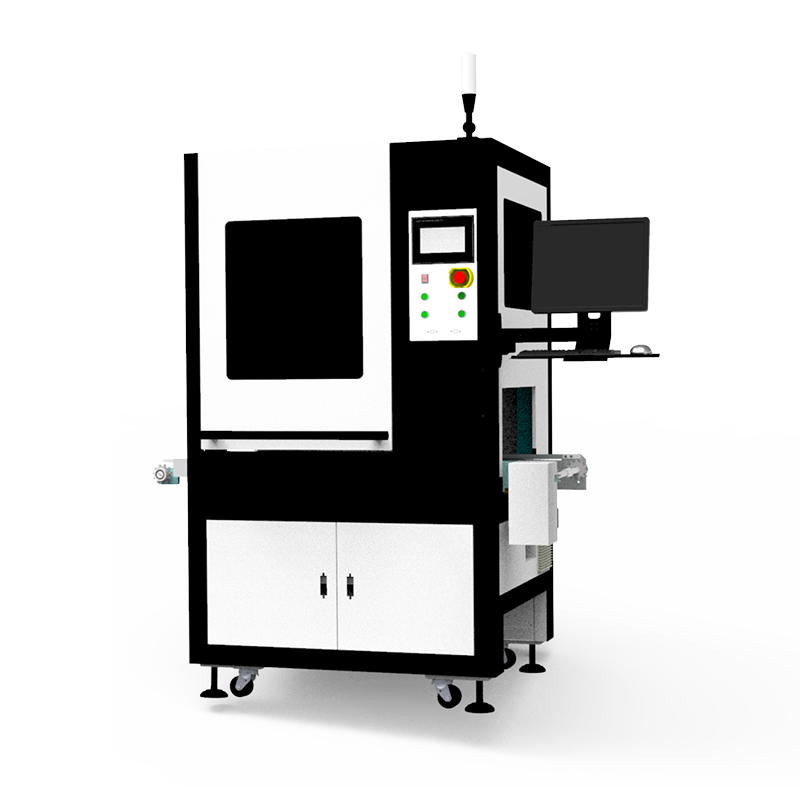 ×
×
เครื่องยึดสกรูอัตโนมัติลดความจำเป็นของแรงงานคนลงอย่างมากโดยการอัตโนมัติภารกิจการยึดสกรูซ้ำๆ ซึ่งช่วยให้ธุรกิจสามารถมอบหมายกำลังคนไปยังบทบาทที่ซับซ้อนและสร้างมูลค่าเพิ่มมากขึ้น ส่งผลให้ประสิทธิภาพในการดำเนินงานโดยรวมเพิ่มขึ้น หลายบริษัทสามารถลดจำนวนพนักงานได้โดยไม่กระทบต่อความสามารถในการผลิต ส่งผลให้ประหยัดต้นทุนแรงงานอย่างมาก ตามการศึกษาด้านการผลิต การใช้งานเครื่องเหล่านี้สามารถลดต้นทุนแรงงานได้อย่างน่าประทับใจถึงสูงสุด 30% นอกจากนี้ การอัตโนมัติยังลดความเสี่ยงของการเกิดข้อผิดพลาดจากมนุษย์ ซึ่งอาจทำให้เกิดค่าใช้จ่ายในการซ่อมแซมและการหยุดชะงักของการผลิต
ระบบอัตโนมัติ เช่น เครื่องล็อคสกรูอัตโนมัติ ช่วยลดค่าใช้จ่ายในการฝึกอบรมลงอย่างมาก เนื่องจากระบบนี้ถูกออกแบบมาให้ทำงานได้อย่างราบรื่นด้วยการแทรกแซงของมนุษย์เพียงเล็กน้อย โปรแกรมการฝึกอบรมที่ครอบคลุมและมักจะมีค่าใช้จ่ายสูงกลายเป็นสิ่งไม่จำเป็น อายุการแนะนำสำหรับพนักงานใหม่ถูกย่อสั้นลงจากหลายสัปดาห์เหลือเพียงไม่กี่วัน ทำให้พวกเขาสามารถสร้างผลผลิตได้เร็วขึ้น ตามการศึกษาที่เกี่ยวข้อง บริษัทที่ใช้การดำเนินงานแบบอัตโนมัติมีค่าใช้จ่ายที่เกี่ยวข้องกับการฝึกอบรมลดลง 50% ซึ่งไม่เพียงแต่สะท้อนถึงงบประมาณการฝึกอบรมที่ลดลง แต่ยังช่วยให้มีการปรับตัวเข้ากับกระบวนการใหม่ได้รวดเร็วขึ้น ทำให้แรงงานมุ่งเน้นไปที่การดำเนินงานหลักโดยไม่มีความล่าช้าที่ไม่จำเป็น
เครื่องยึดสกรูอัตโนมัติมีบทบาทสำคัญในการเร่งรอบการผลิต โดยให้ความแตกต่างอย่างชัดเจนเมื่อเทียบกับวิธีการด้วยมือแบบดั้งเดิม เครื่องเหล่านี้สามารถทำภารกิจการยึดสกรูได้ในเวลาที่สั้นกว่ามาก ลดระยะเวลาการผลิตลงอย่างมาก และช่วยให้ผู้ผลิตสามารถตอบสนองความต้องการได้รวดเร็วกว่า รายงานของอุตสาหกรรมระบุว่ามีการลดเวลาในการทำงานแต่ละรอบลงถึง 40% ซึ่งแสดงให้เห็นถึงประสิทธิภาพของเครื่องในการเร่งการผลิต นอกจากนี้ ระบบเหล่านี้สามารถทำงานต่อเนื่องได้ ช่วยเพิ่มประสิทธิภาพโดยรวมของเครื่องจักร (Overall Equipment Effectiveness - OEE) โดยรักษาการไหลของงานอย่างต่อเนื่อง ไม่มีข้อขัดข้องเหมือนที่เกิดขึ้นในกระบวนการด้วยมือ การทำงานอย่างต่อเนื่องนี้ช่วยเพิ่มผลผลิตและทำให้การส่งมอบงานรวดเร็วขึ้น ซึ่งเป็นปัจจัยสำคัญในการรักษาความได้เปรียบในการแข่งขันทางการผลิต
หนึ่งในประโยชน์เด่นของการใช้เครื่องยึดสกรูอัตโนมัติคือการลดของเสียทางวัสดุอย่างมีนัยสำคัญ อัตโนมัติช่วยให้มีความแม่นยำในการวางตำแหน่งสกรู ซึ่งช่วยลดของเสียที่เกิดจากการใช้งานผิดพลาดหรือการใช้สกรูมากเกินไปได้อย่างมาก รายงานระบุว่าบริษัทที่นำเทคโนโลยีเหล่านี้มาใช้สามารถลดของเสียได้ถึงกว่า 20% ส่งผลให้ต้นทุนวัสดูลดลงและสนับสนุนแนวทางการผลิตที่ยั่งยืน การลดของเสียนอกจากจะช่วยลดต้นทุนแล้ว ยังสอดคล้องกับแนวโน้มของอุตสาหกรรมที่เปลี่ยนไปสู่ความยั่งยืน ลดผลกระทบต่อสิ่งแวดล้อมจากการดำเนินงานการผลิต คุณสมบัติเรื่องความแม่นยำและการลดของเสียแสดงให้เห็นว่าเครื่องยึดสกรูอัตโนมัติเป็นทรัพยากรที่มีคุณค่าในวงการการผลิตทั้งในแง่ประสิทธิภาพทางเศรษฐกิจและความรับผิดชอบต่อสิ่งแวดล้อม
เครื่องยึดสกรูอัตโนมัติที่มาพร้อมกับเครื่องมือวินิจฉัยในตัวที่ล้ำสมัยกำลังปฏิวัติแนวทางการบำรุงรักษา เครื่องมือวินิจฉัยเหล่านี้เป็นส่วนสำคัญสำหรับการบำรุงรักษาเชิงป้องกัน ช่วยลดเวลาหยุดทำงานที่ไม่คาดคิดลงอย่างมาก นอกจากนี้ยังให้ข้อความเตือนอัตโนมัติสำหรับการบำรุงรักษาประจำเพื่อให้แน่ใจว่าเครื่องจักรยังคงทำงานได้อย่างมีประสิทธิภาพสูงสุดและอาจช่วยประหยัดเงินหลายพันบาทจากการซ่อมแซมที่มีค่าใช้จ่ายสูง โดยการนำกลยุทธ์การบำรุงรักษาเชิงป้องกันมาใช้ ผู้ผลิตได้รายงานว่ามีการลดเวลาหยุดทำงานลงถึง 35% ซึ่งเป็นหลักฐานที่น่าประทับใจถึงพลังของเทคโนโลยีเหล่านี้ในการเสริมสร้างความต่อเนื่องของการดำเนินงาน
ประสิทธิภาพในการใช้พลังงานเป็นปัจจัยสำคัญของเครื่องจักรยุคใหม่ และเครื่องล็อคสกรูอัตโนมัติไม่ทำให้ผิดหวังในด้านนี้ เครื่องเหล่านี้มักจะมีคุณสมบัติประหยัดพลังงาน ซึ่งลดการใช้ไฟฟ้าลงอย่างมากเมื่อเทียบกับรุ่นเก่า โดยการนำเทคโนโลยียุคใหม่มาใช้ บริษัทหลายแห่งสามารถประหยัดพลังงานได้ถึง 20% การลดการใช้พลังงานนี้ไม่เพียงแต่ช่วยลดต้นทุนการดำเนินงานอย่างมาก แต่ยังช่วยส่งเสริมผลกระทบเชิงบวกต่อสิ่งแวดล้อมของบริษัท แสดงถึงความมุ่งมั่นในการพัฒนาอย่างยั่งยืน
การผสานใช้งานเครื่องยึดสกรูอัตโนมัติในสายการผลิตมีบทบาทสำคัญในการลดข้อผิดพลาดของมนุษย์โดยการบังคับใช้มาตรฐานที่เป็นเอกภาพ ในอุตสาหกรรมที่ความแม่นยำเป็นสิ่งสำคัญ เครื่องเหล่านี้ได้ลดอัตราสินค้าเสียลงได้ถึง 70% การลดลงนี้ไม่เพียงแต่ช่วยลดการคืนสินค้า แต่ยังช่วยเสริมสร้างชื่อเสียงของแบรนด์ อีกทั้งระบบอัตโนมัติยังช่วยให้มั่นใจว่าแต่ละสกรูจะถูกยึดด้วยคุณภาพที่สม่ำเสมอ ส่งผลให้ลูกค้าและพันธมิตรพึงพอใจมากขึ้น
มาตรฐานการปฏิบัติตามกฎระเบียบในการผลิตเป็นสิ่งที่หลีกเลี่ยงไม่ได้ และเครื่องจักรอัตโนมัติช่วยให้การปฏิบัติตามมาตรฐานเหล่านี้เป็นไปอย่างราบรื่น โดยการหลีกเลี่ยงข้อผิดพลาดทั่วไปที่เกี่ยวข้องกับการดำเนินงานด้วยมือ ธุรกิจสามารถลดความเสี่ยงของการถูกลงโทษจากกฎระเบียบซึ่งอาจเป็นภาระทางการเงินได้อย่างมาก รายงานของผู้เชี่ยวชาญชี้ให้เห็นว่าผลกระทบทางการเงินจากการไม่ปฏิบัติตามกฎมักจะเกินกว่า 500,000 ดอลลาร์สหรัฐสำหรับผู้ผลิตขนาดกลาง ดังนั้น การนำกระบวนการอัตโนมัติมาใช้ไม่เพียงแต่ช่วยป้องกันไม่ให้เกิดการลงโทษเหล่านี้ แต่ยังเพิ่มประสิทธิภาพในการดำเนินงานและความปฏิบัติตามกฎระเบียบ
ประเภทติดตั้งพื้นสามสถานีอัตโนมัติ เครื่องล็อคสกรู ได้รับการออกแบบเพื่อรองรับการดำเนินงานที่มีปริมาณมาก โดยรวมคุณสมบัติที่ช่วยเพิ่มประสิทธิภาพสูงสุด ความสามารถด้านการอัตโนมัติขั้นสูงช่วยให้ผู้ใช้ประสบกับการเพิ่มขึ้นของปริมาณงานและลดต้นทุนในการดำเนินงาน ดีไซน์สามสถานีของเครื่องนี้ช่วยให้สามารถทำงานหลายอย่างพร้อมกัน ทำให้วงจรการผลิตเร็วขึ้นอย่างมาก โดยการกระจายงานไปยังสถานีต่างๆ เครื่องนี้ช่วยให้กระบวนการทำงานลื่นไหลมากขึ้น ซึ่งเป็นสิ่งสำคัญในอุตสาหกรรมที่ทุกวินาทีมีความหมาย

On Line Automatic เครื่องล็อคสกรู เหมาะสมสำหรับการบูรณาการกับระบบสายพานลำเลียง โดยให้การดำเนินงานที่ต่อเนื่องในสภาพแวดล้อมสายการผลิตประเภทต่างๆ โมเดลนี้ช่วยเพิ่มประสิทธิภาพของกระบวนการผลิตโดยการประสานงานงานเกี่ยวกับการล็อคสกรูควบคู่ไปกับกระบวนการผลิตอื่นๆ ซึ่งช่วยเพิ่มผลผลิตโดยรวม ด้วยความน่าเชื่อถือและการใช้งานที่ง่าย เครื่อง On Line เป็นที่น่าสนใจโดยเฉพาะสำหรับผู้ผลิตที่เน้นการดำเนินงานแบบ lean มันช่วยให้มั่นใจว่าภารกิจจะได้รับการจัดการอย่างมีประสิทธิภาพ เพิ่มความสม่ำเสมอและความแม่นยำตลอดสายการผลิต
